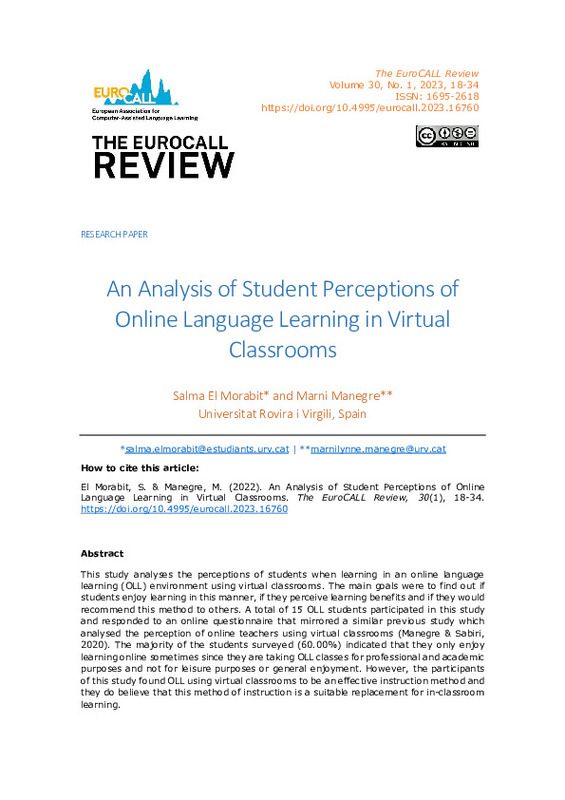Bahasoan, A. N., Wulan Ayuandiani, Muhammad Mukhram, & Aswar Rahmat. (2020). Effectiveness of Online Learning in Pandemic COVID-19. International Journal of Science, Technology & Management, 1(2), 100-106. https://doi.org/10.46729/ijstm.v1i2.30
Berry, S. (2019). The Role of Video and Text Chat in a Virtual Classroom: How Technology Impacts Community. Educational Technology and Resources for Synchronous Learning in Higher Education, 173–187. https://doi.org/10.4018/978-1-5225-7567-2.ch009
Blake, R. (2011). Current Trends in Online Language Learning. Annual Review of Applied Linguistics, 31(35). https://doi.org/10.1017/S026719051100002X
[+]
Bahasoan, A. N., Wulan Ayuandiani, Muhammad Mukhram, & Aswar Rahmat. (2020). Effectiveness of Online Learning in Pandemic COVID-19. International Journal of Science, Technology & Management, 1(2), 100-106. https://doi.org/10.46729/ijstm.v1i2.30
Berry, S. (2019). The Role of Video and Text Chat in a Virtual Classroom: How Technology Impacts Community. Educational Technology and Resources for Synchronous Learning in Higher Education, 173–187. https://doi.org/10.4018/978-1-5225-7567-2.ch009
Blake, R. (2011). Current Trends in Online Language Learning. Annual Review of Applied Linguistics, 31(35). https://doi.org/10.1017/S026719051100002X
Blanco, C. (2020). The 2020 Duolingo Language Report. Duolingo Blog. Retrieved from https://bit.ly/33H0wu8
Castellacci, F., & Tveito, V. (2018). Internet use and well-being: A survey and a theoretical framework. Research policy, 47(1), 308-325. https://doi.org/10.1016/j.respol.2017.11.007
Civinini, C. (2018). Europe is leaving US behind on language learning according to Pew report. The PIE (Professionals in International Education) News. Retrieved from https://bit.ly/34wnNzk
Eurostat. (2020)., People expanding their knowledge by learning online. Retrieved from https://bit.ly/2QZTIFd
Eurostat (2021). Foreign language skills statistics. Retrieved from https://bit.ly/3fSEkTC
Jabeen, S.S., & Thomas, A.J. (2015). Effectiveness of Online Language Learning. Proceedings of the World Congress on Engineering and Computer Science 2015 Vol. I. Retrieved from https://www.iaeng.org/publication/WCECS2015/WCECS2015_pp297-301.pdf
Jenkins, R. (2021). Students feel isolated–online learning can help their mental health. eSchool News. Retrieved from https://bit.ly/3fwcKwq
Ma, A. (2019). The Gaokao is China's Notoriously Tough Entrance Exam, which can also get you into Western Universities. Business Insider. Retrieved from https://bit.ly/3fxNFAZ
Manegre, M., & Sabiri, K. A. (2020). Online Language Learning using Virtual Classrooms: An Analysis of Teacher Perceptions. Computer Assisted Language Learning. https://doi.org/10.1080/09588221.2020.1770290
Michael, K. (2012). Virtual classroom: Reflections of Online Learning. Campus-Wide Information Systems, 29(3), 156–165. https://doi.org/10.1108/10650741211243175
Misir, H., Koç, D. K., & Koç, S. E. (2018). An Analysis of Learner Autonomy and Autonomous Learning Practices in Massive Open Online Language Courses. Arab World English Journal (AWEJ), 29, 24–39. https://dx.doi.org/10.24093/awej/call4.3
Narushima, M., Liu, J., & Diestelkamp, N. (2013). The Association Between Lifelong Learning and Psychological Well-Being Among Older Adults: Implications for Interdisciplinary Health Promotion in an Aging Society. Activities, Adaptation & Aging, 37(3), 239–250. https://doi.org/10.1080/01924788.2013.816834
Nguyen, T. (2015). The Effectiveness of Online Learning: Beyond No Significant Difference and Future Horizons. MERLOT Journal of Online Learning and Teaching, 11(2), 309–319. Retrieved from https://www.researchgate.net/profile/Tuan-Nguyen-186/publication/308171318_The_Effectiveness_of_Online_Learning_Beyond_No_Significant_Difference_and_Future_Horizons/links/57dc114608ae4e6f18469e8c/The-Effectiveness-of-Online-Learning-Beyond-No-Significant-Difference-and-Future-Horizons.pdf
Okita, S. Y. (2012). Social Interactions and Learning. Encyclopedia of the Sciences of Learning, 182–211. https://doi.org/10.1007/978-1-4419-1428-6_1770
Pallavicini, F., Ferrari, A., & Mantovani, F. (2018). Video Games for Well-Being: A Systematic Review on the Application of Computer Games for Cognitive and Emotional Training in the Adult Population. Frontiers in Psychology, 9, 2127. https://doi.org/10.3389/fpsyg.2018.02127
Patrick, O. B. (2020). Effects and Remedies of Culture Shock on Higher Education Students in China. European Journal of Research and Reflection in Educational Sciences Vol, 8(12).
Poggensee, A. (2016). The Effects of Globalization on English Language Learning: Perspectives from Senegal and the United States. Western Michigan University. Available from https://scholarworks.wmich.edu/cgi/viewcontent.cgi?article=3725&context=honors_theses
Raes, A., Vanneste, P., Pieters, M., Windey, I., Van Den Noortgate, W., & Deapaepe, F. (2019). Learning and Instruction in the Hybrid Virtual Classroom: An Investigation of Students’ Engagement and the Effect of Quizzes. Computers & Education, 143. https://doi.org/10.1016/j.compedu.2019.103682
Sims, T., Reed, A. E., & Carr, D. C. (2016). Information and Communication Technology Use Is Related to Higher Well-Being Among the Oldest-Old. The Journals of Gerontology, 72(5), 761–770. https://doi.org/10.1093/geronb/gbw130
Slegers, K., van Boxtel, M. P. J., & Jolles, J. (2008). Effects of Computer Training and Internet Usage on the Well-Being and Quality of Life of Older Adults: A Randomized, Controlled Study. The Journals of Gerontology, 63(3), 176–184. https://doi.org/10.1093/geronb/63.3.P176
Valuates Reports. (2020). Online Language Learning Market Size is Projected to Reach USD 12,452.63 Million by 2025. Cision PR Newswire. https://prn.to/3uLjk7y
Xenos, M. (2018). The Future of Virtual Classroom: Using Existing Features to Move Beyond Traditional Classroom Limitations. Interactive Mobile Communication Technologies and Learning, 725, 944–951. https://doi.org/10.1007/978-3-319-75175-7_9
Zhang, Y. (2019). Chinese parents are paying for their kids to learn English from US online tutors. Here's how the job works. USA Today. Retreived from https://bit.ly/3w2YDnB
[-]









